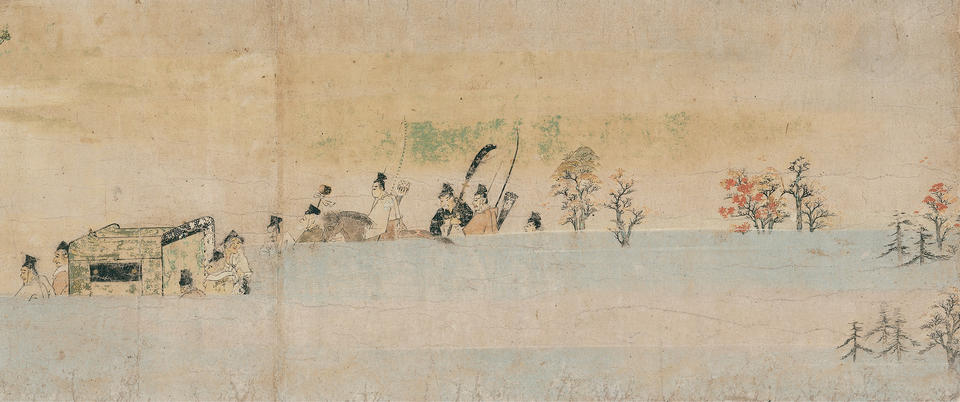Catalogue information
Kamakura period, late 13th century
Fragments of handscroll, mounted as two hanging scrolls
Scroll i: ink and color on paper; 31.1 x 71.5 cm (12 1/4 x 28 1/8 in.)
Scroll ii: ink on paper; 30.5 x 8.4 cm (12 x 3 1/4 in.)
Donated to The Metropolitan Museum of Art, New York by the Mary and Jackson Burke Foundation in 2015
Ex Coll.: Masuda Tarō, Kanagawa Prefecture; Momiyama Hanzaburō; Yoshida Tanzaemon
Literature
Hirata Hisashi 1912, pl. 30
; 1912
[Editor.] Taishikai zuroku (Catalogue of the Taishikai tea ceremony). Tokyo: Hirata Hisashi.
Murase 1975, no. 21
; 1975
Japanese Art: Selections from the Mary and Jackson Burke Collection. Exh. cat. New York: The Metropolitan Museum of Art.
Tokyo National Museum 1985a, no. 5
; 1985a
Nihon bijutsu meihin ten: New York Burke Collection / A Selection of Japanese Art from the Mary and Jackson Burke Collection. Exh. cat. Tokyo: Chunichi Shimbun.
Avitabile 1990, no. 20
; 1990
[Editor]. Die Kunst des alten Japan: Meisterwerke aus der Mary and Jackson Burke Collection, New York. Exh. cat. Frankfurt: Schirn Kunsthalle Frankfurt.
Tokyo National Museum 1993, no. 19
; 1993
Yamato-e: Miyabi no keifu (Yamato-e: Japanese painting in the tradition of courtly elegance). Exh. cat. Tokyo: Tokyo National Museum.
Murase 2000, no. 37
; 2000
Bridge of Dreams: The Mary Griggs Burke Collection of Japanese Art. Exh. cat. New York: The Metropolitan Museum of Art.
Tsuji Nobuo et al. 2005, no. 21.
2005
Nyūyōku Bāku korekushon-ten: Nihon no bi sanzennen no kagayaki / Enduring Legacy of Japanese Art: The Mary Griggs Burke Collection. Exh. cat., Museum of Fine Arts, Gifu; Hiroshima Prefectural Museum of Art; Tokyo Metropolitan Art Museum; and Miho Museum, Shigaraki, Shiga Prefecture. [Tokyo]: Nihon Keizai Shinbunsha.
See also
This artwork was published as catalogue entry 42 in Volume I of Art through a Lifetime.
Additional details
Text
Then they arrived in the capital and went to the mansion of Chūjō’s father, who was upset about his son’s secret marriage to an unknown country girl. Nevertheless, he built a special wing of the house for them and there established the newlyweds.


